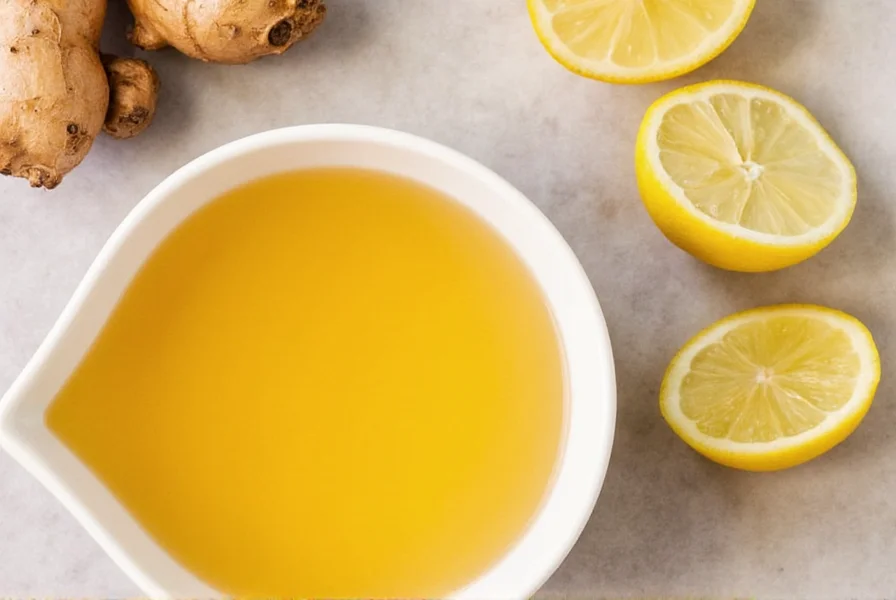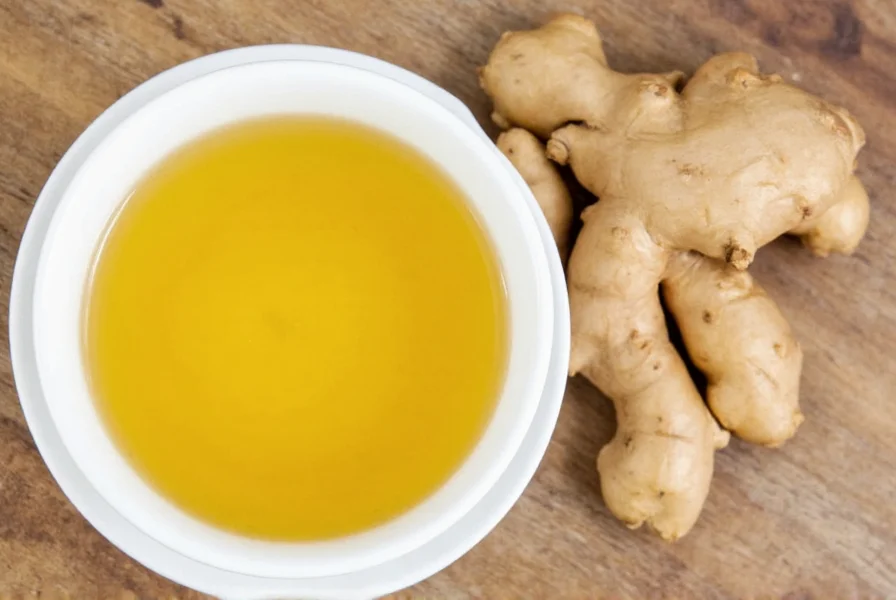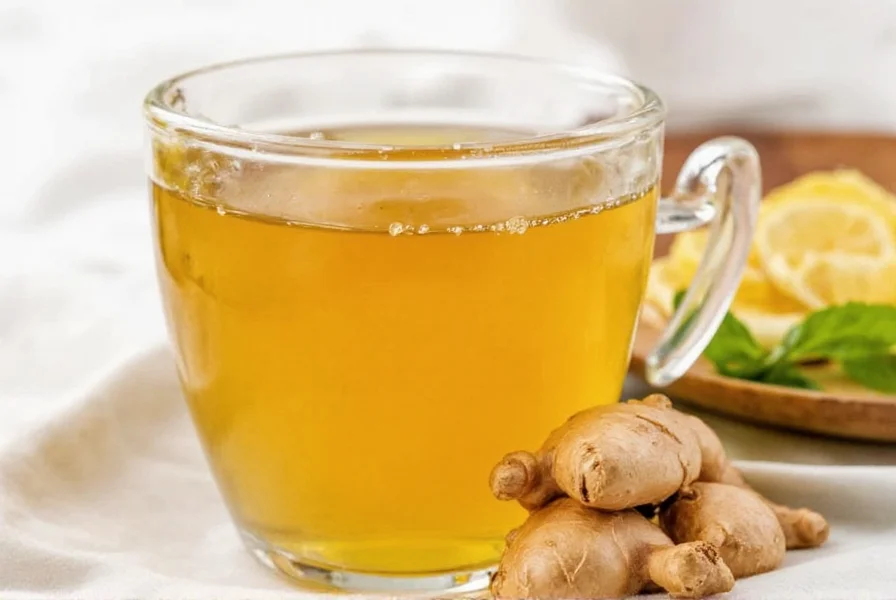The quickest way to make fresh ginger tea is to slice 1-2 inches of peeled ginger root, boil it in 2 cups of water for 10-15 minutes, then strain and add lemon or honey to taste. This simple preparation delivers maximum ginger benefits while preserving its natural flavor and therapeutic properties.
Making fresh ginger tea at home is one of the simplest yet most rewarding wellness rituals you can incorporate into your daily routine. Unlike store-bought versions that often contain artificial flavors or excessive sugar, homemade ginger tea provides pure, unadulterated benefits from nature's powerful root. Whether you're seeking relief from digestive discomfort, looking to boost your immune system, or simply wanting a comforting beverage, fresh ginger tea delivers on multiple fronts.
Why Fresh Ginger Tea Outperforms Store-Bought Alternatives
When you prepare ginger tea from fresh root rather than using tea bags or powdered ginger, you access higher concentrations of gingerol—the active compound responsible for ginger's therapeutic effects. Fresh ginger contains up to 20 times more gingerol than dried ginger, making it significantly more potent for addressing inflammation, nausea, and digestive issues. The aromatic experience of brewing fresh ginger also releases volatile oils that contribute to its therapeutic profile, creating a sensory experience that pre-packaged options simply cannot match.
Essential Ingredients for Perfect Fresh Ginger Tea
The beauty of this recipe lies in its simplicity. You only need a few quality ingredients to create a beverage that's both healing and delicious:
| Ingredient | Amount | Preparation Notes |
|---|---|---|
| Fresh ginger root | 1-2 inches | Choose firm, smooth roots with tight skin |
| Filtered water | 2 cups | Spring water enhances flavor profile |
| Lemon | ½, sliced | Optional but recommended for vitamin C boost |
| Raw honey | 1-2 tsp | Add after cooling slightly to preserve enzymes |
Step-by-Step Preparation Guide
Follow these precise steps to create the perfect cup of fresh ginger tea that maximizes both flavor and health benefits:
- Prepare the ginger: Wash and peel 1-2 inches of fresh ginger root. For stronger tea, leave the skin on (ensure it's organic). Thinly slice or julienne the ginger to increase surface area for optimal extraction.
- Boil the water: Bring 2 cups of filtered water to a rolling boil in a stainless steel or glass pot (avoid aluminum which can react with ginger compounds).
- Simmer the ginger: Add the prepared ginger to the boiling water, reduce heat to medium-low, and simmer uncovered for 10-15 minutes. Longer simmering (up to 20 minutes) creates a stronger, more medicinal tea.
- Add complementary ingredients: During the last 2 minutes of simmering, add lemon slices. Remove from heat before adding honey to preserve its beneficial enzymes.
- Strain and serve: Pour the tea through a fine mesh strainer into your favorite mug. For continuous sipping throughout the day, store the concentrated tea in a glass jar in the refrigerator and dilute with hot water as needed.

Advanced Techniques for Optimal Ginger Tea
While the basic preparation delivers excellent results, these professional techniques elevate your fresh ginger tea experience:
- Cold extraction method: For a more delicate flavor profile with different therapeutic compounds, slice ginger thinly and steep in cold water for 4-8 hours. This method preserves heat-sensitive compounds while extracting different beneficial constituents.
- Ginger-to-water ratio: Adjust based on your purpose—use 1 inch of ginger per 2 cups of water for daily maintenance, 2 inches for digestive support, and up to 3 inches for acute nausea or inflammation.
- Timing matters: Morning tea benefits from lemon and minimal sweetener for digestion, while evening tea can include calming additions like a pinch of turmeric or a slice of orange for relaxation.
Customizing Your Fresh Ginger Tea
Personalize your ginger tea experience with these complementary additions that enhance both flavor and therapeutic value:
| Addition | Amount | Benefits | When to Add |
|---|---|---|---|
| Fresh mint leaves | 5-6 leaves | Enhances digestion, adds refreshing note | Last 2 minutes of simmering |
| Turmeric | ¼ tsp powdered or ½ inch fresh | Boosts anti-inflammatory effects | With ginger at beginning |
| Cinnamon stick | 1 small stick | Regulates blood sugar, adds warmth | With ginger at beginning |
| Apple cider vinegar | 1 tsp | Supports digestion, enhances nutrient absorption | After removing from heat |

When to Drink Fresh Ginger Tea for Maximum Benefits
The timing of your ginger tea consumption significantly impacts its effectiveness for different health goals:
- Morning: Drink 15-20 minutes before breakfast to stimulate digestive enzymes and prepare your system for the day's meals. This timing maximizes ginger's ability to reduce morning nausea and boost metabolism.
- Before meals: Consuming ginger tea 10-15 minutes before eating enhances digestion by increasing saliva and gastric enzyme production, potentially reducing bloating and indigestion.
- After travel: Ginger tea is particularly effective within 30 minutes of experiencing motion sickness symptoms, with effects noticeable within 20 minutes due to ginger's rapid absorption.
- Evening: For relaxation without caffeine interference, enjoy ginger tea 1-2 hours before bedtime—its warming properties can promote restful sleep when combined with calming additions like chamomile.
Storage and Preservation Techniques
Proper storage extends the benefits of your fresh ginger tea preparation:
- Refrigerate concentrated ginger tea (2 inches ginger to 2 cups water) in a glass container for up to 5 days
- Freeze in ice cube trays for convenient single servings—thaw by adding hot water directly to the frozen cube
- Store fresh ginger root in the refrigerator wrapped in a paper towel inside a perforated plastic bag for up to 3 weeks
- For long-term storage, peel and freeze whole ginger root, then grate directly into hot water when needed
Common Mistakes to Avoid When Making Ginger Tea
Even simple preparations can go wrong. Steer clear of these common pitfalls:
- Over-boiling: Simmering ginger for more than 20 minutes can degrade some beneficial compounds while making the tea unpleasantly bitter
- Adding honey while too hot: Temperatures above 140°F (60°C) destroy honey's beneficial enzymes and antioxidants—wait until tea cools to about 120°F (50°C)
- Using old ginger: Stale ginger loses potency—choose roots that are firm with smooth skin, avoiding any with wrinkles or soft spots
- Insufficient steeping time: For optimal extraction of gingerols, simmer for at least 10 minutes—shorter times yield weaker medicinal effects
Frequently Asked Questions
How much fresh ginger should I use for one cup of tea?
For a single cup (8 ounces) of tea, use ½ to 1 inch of fresh ginger root, sliced or grated. If you're making tea specifically for digestive issues or nausea, increase to 1-1.5 inches. Remember that thicker slices require longer steeping times than grated ginger for equivalent strength.
Can I reuse ginger for multiple tea batches?
Yes, you can typically reuse ginger root for 2-3 batches of tea. After the first brewing, store the used ginger in the refrigerator and use within 24 hours. Each subsequent batch will be milder, so increase steeping time by 5 minutes for each reuse. Discard when the ginger becomes pale and loses its characteristic aroma.
Is fresh ginger tea safe during pregnancy?
Fresh ginger tea is generally considered safe during pregnancy in moderate amounts (up to 1 gram of ginger per day, equivalent to about 1 inch of root in 2 cups of tea). Many healthcare providers recommend it for morning sickness relief. However, pregnant women should consult their healthcare provider before consuming ginger regularly, especially during the first trimester or if they have a history of miscarriage.
How long does fresh ginger tea retain its medicinal properties?
Freshly brewed ginger tea maintains optimal medicinal properties for about 2-3 hours at room temperature. When refrigerated in a sealed container, it preserves most benefits for up to 48 hours, though some volatile compounds begin degrading after 24 hours. For maximum therapeutic value, consume within 4 hours of preparation. Freezing preserves the majority of benefits for up to 3 months.
Can I make ginger tea without boiling water?
Yes, you can make effective ginger tea using the cold steep method. Thinly slice 2 inches of ginger and add to 2 cups of cold water. Refrigerate for 4-8 hours or overnight. This method extracts different compounds than boiling, resulting in a milder tea with preserved heat-sensitive enzymes. While it contains slightly less gingerol than boiled tea, it offers complementary health benefits and is ideal for those who prefer a less intense flavor.











 浙公网安备
33010002000092号
浙公网安备
33010002000092号 浙B2-20120091-4
浙B2-20120091-4